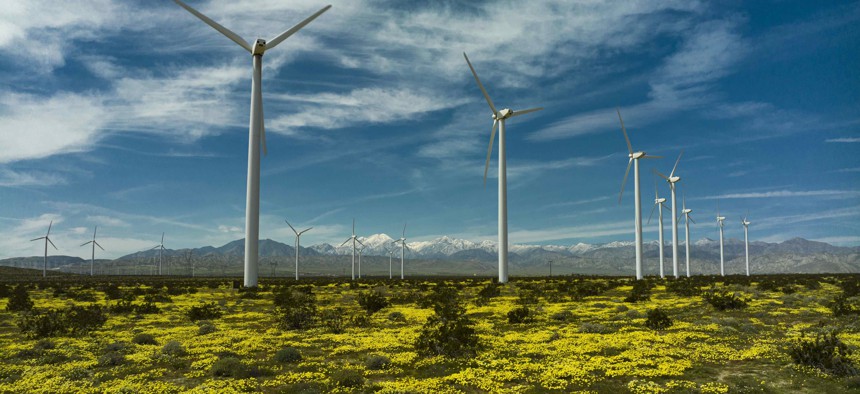Why some power companies support climate laws, but others don’t

Spring yellow flowers grow beneath swirling Wind Mills outside of Palm Springs, California. Visions of America/Joseph Sohm/Universal Images Group via Getty Images
Electric utilities have considerable political juice in state capitols, which a study found they can use to promote or stymie greenhouse gas reduction efforts.
The fate of proposals in state legislatures to curtail greenhouse gas pollution from power plants is often shaped by decisions made decades ago, according to a recent study.
Joshua Basseches, a professor of public policy and environmental studies at Tulane University, noted that investor-owned electric utilities are among the most powerful political actors in almost every state capitol. Three-quarters of Americans get their electricity from those private companies. But how those utilities react to carbon reduction plans often depends on how each state sets up its power market, he explained in a study published by the academic journal Politics & Society.
Many states overhauled the way electric utilities operate in the 1990s and early 2000s, he noted. Traditionally, the electric company owned the grid and the power plants that supplied them. They operated as monopolies, with rates that had to be approved by state regulators to cover their expenses and turn out a predictable profit. But then many states split up the jobs of producing power and transmitting it to people’s homes and businesses. Suddenly, the company that generated the electricity could be different from the “poles and wires” company that delivered it.
“In states that restructured, where utilities do not own generation, the utilities are not necessarily an obstacle to passing renewable energy policies,” Basseches told Route Fifty. “However, they are likely to shift costs” to their customers for greenhouse gas policies.
The study of how landmark climate laws passed while other attempts faltered comes as electric utilities are under increased public scrutiny for their outsized political influence and sometimes lackluster efforts to address climate change. Electric utilities’ wielding of that influence led to scandals that resulted in the downfall of powerful legislative leaders in Illinois and Ohio. Widespread frustration with private power companies in Maine sparked a ballot measure that could put them under public control. And after years of downplaying the risks of climate change from burning fossil fuels, electric companies now are struggling to cope with its effects, such as wildfires and crippling heat waves.
“There’s just more awareness than there has been historically about these utilities,” Basseches said. “That doesn’t necessarily mean that things are going to change. But it does mean that the public is paying more attention, and a lot of that has been because of the clean energy transition.”
The Tulane professor’s study looked at different greenhouse gas policies passed by three states where Democrats dominate the legislature: California, Massachusetts and Oregon.
In California, the electric utilities are separate from the generating companies. In fact, the utilities are prohibited from owning power-producing outfits. That’s why, Basseches explained, electric utilities including PG&E actually threw their weight behind the passage of a landmark 2006 climate law that led to the state’s cap-and-trade system for greenhouse gases.
“[The private utilities] lent their significant political power to ensure that traditional business actors and residential energy consumers, not themselves, would bear any of the policy's potential costs; and [investor-owned utilities] reaped the rewards of a public relations win and the potential to profit from energy efficiency incentives, at no cost, due to California's fully restructured electricity sector,” he wrote.
In Massachusetts, the utilities operate in a similar environment as in California. But when lawmakers started pushing ambitious climate change legislation in 2008, the utilities hardly weighed in because they were more focused on a separate bill changing the state’s renewable portfolio standards that could have affected their bottom lines. Without their input, the broader greenhouse gas proposal passed and was ultimately not as effective as California’s law.
“The result,” Basseches wrote, “was less carefully crafted legislation, which contributed to a less environmentally effective policy, lacking the same explicit regulatory requirements as in California and containing [greenhouse gas] targets with questionable enforceability.”
In Oregon, on the other hand, utility companies were not forced to spin off their generating functions, including those that use coal and natural gas. The focus of restructuring Oregon’s electric market was to allow large, industrial customers to choose different sources of electricity in order to save money.
That had repercussions down the road, Basseches wrote: “An environmentally weak [greenhouse gas] policy that gave environmentalists a superficial ‘win’ would pass [the investor-owned utilities’] muster, but stronger legislation, particularly legislation that might lead to carbon pricing … was where Oregon [utilities] drew the line.”
The same self-interest among power companies also shaped state policies on their renewable portfolio standards, which specify how much of a state’s power supply has to come from environmentally friendly sources like wind, solar or hydropower.
“They just made sure that if anything were to go south in terms of renewables,” Basseches said in an interview, “that they would be completely absolved of having to absorb any of those expenses. It was basically a zero-risk proposition for them. They have nothing to lose whatsoever.”
“Some people are willing to take that trade off. They’re willing to sell out other competing interests for the sake of getting some law on the books that could actually tackle climate change. But it’s also deeply problematic, because any risks or costs utilities are not paying are being borne by someone else,” he said.
Basseches said he is now researching whether similar dynamics play out in Republican-dominated states, such as Texas. The results are preliminary, but he said the same pattern appears to hold true there too. “Partisanship does matter,” he said. “But it’s not the only thing and, in the case of renewable portfolio standards, it may even matter less than the structure of the utility sector.”
Daniel C. Vock is a senior reporter for Route Fifty based in Washington, D.C.
NEXT STORY: 7 million Americans lose Medicaid coverage






